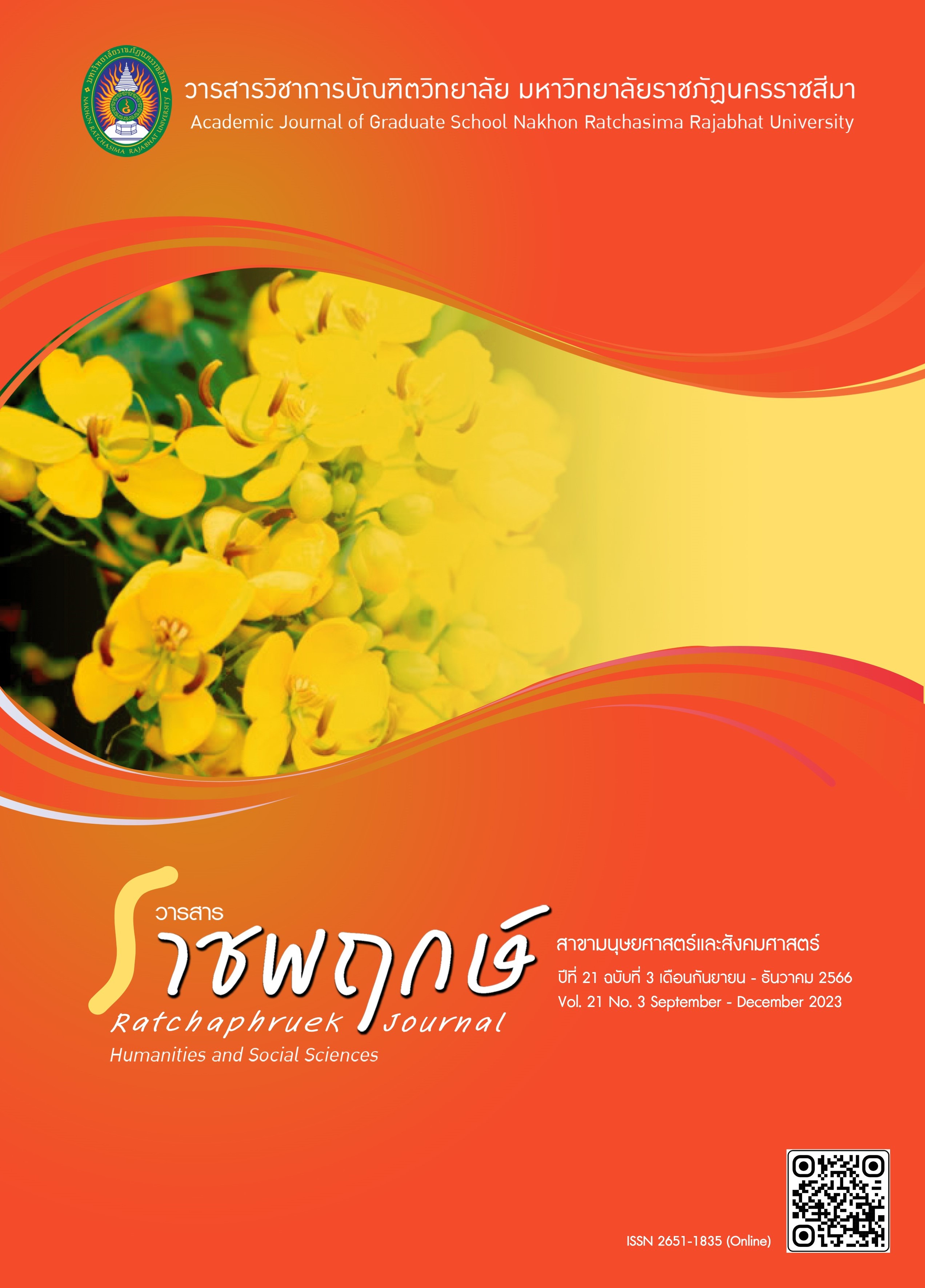Generation Z Adolescence: Essential Age and Time of Life
Main Article Content
Abstract
Adolescence is the period that has essential life changes; physical, emotional, social, and intellectual. They desire to discover their own identity and use more sophisticated thinking in considering foundational to abstract things. Adolescence is the age of curiosity and learning to live in preparation for becoming an adult. Currently, adolescence is Generation Z who has grown up in a world that is highly advanced in technology. Their life which is connected to the online world network leads to higher levels of both skills and knowledge. However, fast and changing all the time living makes these adolescents have a faster pace of life and less interaction with other people. These lifestyles tend to develop behaviors that are mental health problems, and the risk of depression, including bullying. This article presents the developmental issues of adolescence, important characteristics, crises, and ways to promote the potential of Generation Z adolescents so that readers can understand this group better.
Article Details

This work is licensed under a Creative Commons Attribution-NonCommercial-NoDerivatives 4.0 International License.
References
กรมสุขภาพจิต กระทรวงสาธารณสุข. (2564). รายงานประจำปีกรมสุขภาพจิต ปีงบประมาณ 2563. สืบค้นเมื่อ 5 เมษายน 2566, จาก https://www.dmh-elibrary.org/items/show/334
นิชาภา พัฒนากูลชัย, สุวรรณา มณีวงศ์ และอังธนา จุลสุคนธ์. (2561). สื่อสังคมออนไลน์กับสมองของเด็กวัยรุ่น. วารสารวิชาการมหาวิทยาลัยอีสเทิร์นเอเชีย ฉบับวิทยาศาสตร์และเทคโนโลยี, 12(3), น. 118-123.
นุชลี อุปภัย. (2558). จิตวิทยาการศึกษา (พิมพ์ครั้งที่ 4). กรุงเทพฯ: จุฬาลงกรณ์มหาวิทยาลัย.
ชุตินาถ ศักรินทร์กุล และอลิสา วัชรสินธุ. (2557). ความชุกของการข่มเหงรังแกและปัจจัยด้านจิต สังคมที่เกี่ยวข้องในเด็กมัธยมต้น เขตอำเภอเมือง จังหวัดเชียงใหม่. วารสารสมาคมจิตแพทย์แห่งประเทศไทย, 59(3), น. 221-230.
ฐิตารีย์ ธรรมลักษมี. (2566). วิจัยเผย โควิดส่งผลกระทบต่อคน ‘Gen-Z’ ขาดทักษะการสื่อสารและความมั่นใจในที่ทำงาน. สืบค้นเมื่อ 22 สิงหาคม 2566, จาก https://www. gqthailand. com/culture/article/gen-z-lacks-the-communication-workforce
ปัทมาภรณ์ สุขสมโสด และปฐมพงษ์ พุ่มพฤกษ์. (2564). ผลกระทบต่อการใช้สื่อสังคมออนไลน์ต่อการเปลี่ยนแปลงค่านิยมวัยรุ่นในพระนครศรีอยุธยา. วารสารวิชาการอยุธยาศึกษา, 13(1), น. 119-137.
วิภารัตน์ สุวรรณไวพัฒนา, จุรีรัตน์ แก้วท่า, ขนิษฐา ชุมกระโทก และธิดารัตน์ แยแพงพะเนาว์. (2559). ความสัมพันธ์ระหว่างปัจจัยบางประการกับภาวะซึมเศร้าของวัยรุ่นจังหวัดนครราชสีมา ประเทศไทย. วารสารวิชาการมหาวิทยาลัยอีสเทิร์นเอเชีย ฉบับวิทยาศาสตร์และเทคโนโลยี, 10(3), น. 129-143.
วิมลวรรณ ปัญญาว่อง, รัตนศักดิ์ สันติธาดากุล และโชษิตา ภาวสุทธิไพศิฐ. (2563). ความชุกของภาวะซึมเศร้าและความเสี่ยงฆ่าตัวตายในวัยรุ่นไทย: การสำรวจโรงเรียนใน 13 เขตสุขภาพ. วารสารสุขภาพจิตแห่งประเทศไทย, 28(2), น. 136-149.
ศุภรดา ชุมพาลี และทัศนา ทวีคูณ. (2562). พฤติกรรมรังแกกันของนักเรียนชั้นมัธยมศึกษาตอนต้น ของจังหวัดหนึ่งในภาคกลาง ประเทศไทย. วารสารการพยาบาลจิตเวชและสุขภาพจิต, 33(3), น. 128-148.
สุรางค์ โค้วตระกูล. (2564). จิตวิทยาการศึกษา (พิมพ์ครั้งที่ 13). กรุงเทพฯ: จุฬาลงกรณ์มหาวิทยาลัย.
สำนักงานพัฒนาธุรกรรมทางอิเล็กทรอนิกส์ กระทรวงดิจิทัลเพื่อเศรษฐกิจและสังคม. (2563). รายงานผลการสำรวจพฤติกรรมผู้ใช้อินเทอร์เน็ตในประเทศไทย ปี 2562 Thailand Internet User Behavior 2019. สืบค้นเมื่อ 10 เมษายน 2566, จาก https://www.etda. or.th/th/Useful-Resource//publications/Thailand-Internet-User-Behavior-2019_Th.aspx? viewmode=0
อริยา คูหา. (2562). จิตวิทยาเพื่อการดำรงชีวิต (พิมพ์ครั้งที่ 4). สงขลา: นิโอพ้อยท์ (1995).
อุดม คชินทร. (2561). การเปลี่ยนแปลงของวงการการศึกษาในยุคของคนรุ่น Z. ใน งานมหกรรมอุดมศึกษา UniversitiesXpo: อุดมศึกษา-พลังขับเคลื่อนประเทศไทย 4.0 (Universities, the driver of Thailand 4.0), วันที่ 2-4 มีนาคม 2561. (น.1-50). กรุงเทพฯ: ที่ประชุมอธิการบดีแห่งประเทศไทย.
Castle, P. & Scott, B. (2018). Psychology for teachers. London: Sage Publications.
Cetin, M. & Halisdemir, M. (2019). School administrator and Generation Z students’ perspectives for a better educational setting. Journal of Education and Training Studies, 7(2), pp. 84-97.
Desai, S. P. & Lele, V. (2017). Correlating internet, social networks and workplace: a case of Generation Z students. Journal of Commerce and Management Thought, 8(4), pp. 802-815.
Gibbs, J. C. (2020). Stages of adolescent moral development. In Hupp, S & Jewell, J. D. (Eds.). The Encyclopedia of Child and Adolescent Development. Wiley-Blackwell: Hoboken, NJ, USA.
Gabrielova, K. & Buchko, A. A. (2021). Here comes Generation Z: Millennials as managers. Business Horizons, 64(4), pp. 489-499.
Gunnell, D., Kidger, J. & Elvidge, H. (2018). Adolescent mental health in crisis. BMJ, K2608. https://doi.org/10.1136/bmj.k2608
Hakim, S. N., Nahdiyah. & Ali, M. (2020). Role of moral education towards adolescent morality. Palarch’s Journal of Archeology of Egypt/Egyptology, 17(7), pp. 3532-3543. Retrieved from https://archives.palarch.nl/index.php/jae/article/ view/1935.
Hong, J. S., Ryou, B. & Piquero, A. R. (2020). Do Family-Level Factors Associated with Bullying Perpetration and Peer Victimization Differ by Race? Comparing European American and African American Youth. Journal of interpersonal violence, 35(21-22), pp. 4327-4349.
Igel, C. & Urquhart, V. (2012). Generation Z, meet cooperative learning: properly implemented cooperative learning strategies can increase student engagement and achievement. Middle School Journal, 43(4), pp. 16-21.
Lee, K., Anzures, G. & Freire, A. (2017). Cognitive development in adolescent (3rd ed.). In Slater, A. & Bremner, G. (Ed.). An Introduction to Developmental Psychology. Singapore: Markono Print Media Pte.
Mazurek, M. (2019). Generation Z as a challenge for the traditional corporate culture in Poland. Kwartalnik Kolegium Ekonomiczno-Społecznego Studia i Prace, 1(37), pp. 167-180.
McLeod, S. (2010). Formal Operation Stage. Simply Psychology. Retrieved 2023 May, 30, from https://www.simplypsychology.org/formal-operational.html
Pasam, R. S. (2019). Advances in digital technology: Effect on Child and Adolescent Behavior. Archives of Mental Health, 20(2), pp. 37-40.
Pengpid, S. & Peltzer, K. (2013). Bullying and Its Associated Factors Among School-aged Adolescents in Thailand. The Scientific World Journal, 2013(1), p. 254083. https://doi.10.1155/2013/254083
Persada, S. F., Miraja, B. A. & Nadlifatin, R. (2019). Understanding the Generation Z Behavior on D-Learning: A Unified Theory of Acceptance and Use of Technology (UTAUT) Approach. International Journal of Emerging Technologies in Learning, 14(5), pp. 20-33.
Sanghvi, P. (2020). Piaget’s theory of cognitive development: a review. Indian Journal of Mental Health, 7(2), pp. 90-96.
Torocsik, M., Szucs, K. & Kehl, D. (2014). How generations think: research on Generation Z. Acta Universitatis Sapientiae, Communication, 2014(1), pp. 23-45.


